
- 阻害剤
- 研究分野別
- PI3K/Akt/mTOR
- Epigenetics
- Methylation
- Immunology & Inflammation
- Protein Tyrosine Kinase
- Angiogenesis
- Apoptosis
- Autophagy
- ER stress & UPR
- JAK/STAT
- MAPK
- Cytoskeletal Signaling
- Cell Cycle
- TGF-beta/Smad
- 化合物ライブラリー
- Popular Compound Libraries
- Customize Library
- Clinical and FDA-approved Related
- Bioactive Compound Libraries
- Inhibitor Related
- Natural Product Related
- Metabolism Related
- Cell Death Related
- By Signaling Pathway
- By Disease
- Anti-infection and Antiviral Related
- Neuronal and Immunology Related
- Fragment and Covalent Related
- FDA-approved Drug Library
- FDA-approved & Passed Phase I Drug Library
- Preclinical/Clinical Compound Library
- Bioactive Compound Library-I
- Bioactive Compound Library-II
- Kinase Inhibitor Library
- Express-Pick Library
- Natural Product Library
- Human Endogenous Metabolite Compound Library
- Alkaloid Compound LibraryNew
- Angiogenesis Related compound Library
- Anti-Aging Compound Library
- Anti-alzheimer Disease Compound Library
- Antibiotics compound Library
- Anti-cancer Compound Library
- Anti-cancer Compound Library-Ⅱ
- Anti-cancer Metabolism Compound Library
- Anti-Cardiovascular Disease Compound Library
- Anti-diabetic Compound Library
- Anti-infection Compound Library
- Antioxidant Compound Library
- Anti-parasitic Compound Library
- Antiviral Compound Library
- Apoptosis Compound Library
- Autophagy Compound Library
- Calcium Channel Blocker LibraryNew
- Cambridge Cancer Compound Library
- Carbohydrate Metabolism Compound LibraryNew
- Cell Cycle compound library
- CNS-Penetrant Compound Library
- Covalent Inhibitor Library
- Cytokine Inhibitor LibraryNew
- Cytoskeletal Signaling Pathway Compound Library
- DNA Damage/DNA Repair compound Library
- Drug-like Compound Library
- Endoplasmic Reticulum Stress Compound Library
- Epigenetics Compound Library
- Exosome Secretion Related Compound LibraryNew
- FDA-approved Anticancer Drug LibraryNew
- Ferroptosis Compound Library
- Flavonoid Compound Library
- Fragment Library
- Glutamine Metabolism Compound Library
- Glycolysis Compound Library
- GPCR Compound Library
- Gut Microbial Metabolite Library
- HIF-1 Signaling Pathway Compound Library
- Highly Selective Inhibitor Library
- Histone modification compound library
- HTS Library for Drug Discovery
- Human Hormone Related Compound LibraryNew
- Human Transcription Factor Compound LibraryNew
- Immunology/Inflammation Compound Library
- Inhibitor Library
- Ion Channel Ligand Library
- JAK/STAT compound library
- Lipid Metabolism Compound LibraryNew
- Macrocyclic Compound Library
- MAPK Inhibitor Library
- Medicine Food Homology Compound Library
- Metabolism Compound Library
- Methylation Compound Library
- Mouse Metabolite Compound LibraryNew
- Natural Organic Compound Library
- Neuronal Signaling Compound Library
- NF-κB Signaling Compound Library
- Nucleoside Analogue Library
- Obesity Compound Library
- Oxidative Stress Compound LibraryNew
- Phenotypic Screening Library
- PI3K/Akt Inhibitor Library
- Protease Inhibitor Library
- Protein-protein Interaction Inhibitor Library
- Pyroptosis Compound Library
- Small Molecule Immuno-Oncology Compound Library
- Mitochondria-Targeted Compound LibraryNew
- Stem Cell Differentiation Compound LibraryNew
- Stem Cell Signaling Compound Library
- Natural Phenol Compound LibraryNew
- Natural Terpenoid Compound LibraryNew
- TGF-beta/Smad compound library
- Traditional Chinese Medicine Library
- Tyrosine Kinase Inhibitor Library
- Ubiquitination Compound Library
-
Cherry Picking
You can personalize your library with chemicals from within Selleck's inventory. Build the right library for your research endeavors by choosing from compounds in all of our available libraries.
Please contact us at info@selleck.co.jp to customize your library.
You could select:
- FDA-approved Drug Library
- FDA-approved & Passed Phase I Drug Library
- Preclinical/Clinical Compound Library
- Bioactive Compound Library-I
- Bioactive Compound Library-II
- Kinase Inhibitor Library
- Express-Pick Library
- Natural Product Library
- Human Endogenous Metabolite Compound Library
- Covalent Inhibitor Library
- FDA-approved Anticancer Drug LibraryNew
- Highly Selective Inhibitor Library
- HTS Library for Drug Discovery
- Metabolism Compound Library
- 抗体
- 新製品
- お問い合わせ
TNF-alpha
亜型選択性的な製品
シグナル伝達経路

TNF-alpha製品
- All (73)
- TNF-alpha阻害剤 (51)
- TNF-alpha抗体(5)
- TNF-alpha活性剤(4)
- TNF-alpha拮抗剤(2)
- TNF-alpha作動薬(3)
- TNF-alphaモジュレータ(1)
- 新製品
| 製品コード | 製品名称 | 製品説明 | 文献中Selleckの製品使用例 | お客様のフィードバック |
|---|---|---|---|---|
| S8037 | Necrostatin-1 | Necrostatin-1 (Nec-1) is a specific RIP1 (RIPK1) inhibitor and inhibits TNF-α-induced necroptosis with EC50 of 490 nM in 293T cells. Necrostatin-1 also blocks IDO and suppresses autophagy and apoptosis. |
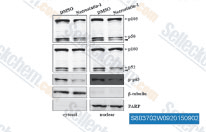
|
|
| S1623 | Acetylcysteine (N-acetylcysteine) | Acetylcysteine (N-acetyl-l-cysteine, NAC,N-acetylcysteine) is a ROS(reactive oxygen species) inhibitor that antagonizes the activity of proteasome inhibitors. It is also a tumor necrosis factor production inhibitor. Acetylcysteine(N-acetyl-l-cysteine) suppresses TNF-induced NF-κB activation through inhibition of IκB kinases. Acetylcysteine(N-acetyl-l-cysteine) induces apoptosis via the mitochondria-dependent pathway. Acetylcysteine(N-acetyl-l-cysteine) inhibits ferroptosis and virus replication.Solutions are unstable and should be fresh-prepared. |
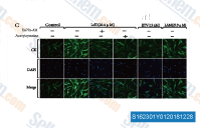
|
|
| S1029 | Lenalidomide | Lenalidomide is a TNF-α secretion inhibitor with IC50 of 13 nM in PBMCs. Lenalidomide (CC-5013) is a ligand of ubiquitin E3 ligase cereblon (CRBN), and it causes selective ubiquitination and degradation of two lymphoid transcription factors, IKZF1 and IKZF3, by the CRBN-CRL4 ubiquitin ligase. Lenalidomide promotes cleaved caspase-3 expression and inhibit VEGF expression and induces apoptosis. |
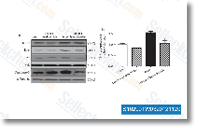
|
|
| S4902 | QNZ (EVP4593) | QNZ (EVP4593) shows potent inhibitory activity toward both NF-κB activation and TNF-α production with IC50 of 11 nM and 7 nM in Jurkat T cells, respectively. |
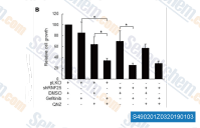
|
|
| S1567 | Pomalidomide | Pomalidomide inhibits LPS-induced TNF-α release with IC50 of 13 nM in PBMCs. Pomalidomide can be utilized in PROTAC as a ligand for targeting E3 ligase and inhibiting the E3 ligase protein cereblon (CRBN). Pomalidomide promotes apoptosis and cell cycle arrest. |
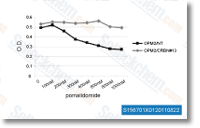
|
|
| S7455 | Resatorvid (TAK-242) | Resatorvid (TAK-242, CLI-095) is a small-molecule-specific inhibitor of Toll-like receptor (TLR) 4 signaling, blocking LPS-induced production of NO, TNF-α and IL-6 in macrophages with IC50 of 1.8 nM, 1.9 nM and 1.3 nM, respectively. Resatorvid downregulates expression of TLR4 downstream signaling molecules MyD88 and TRIF. Resatorvid inhibits autophagy. | ||
| S1189 | Aprepitant | Aprepitant is a potent and selective neurokinin-1 receptor antagonist with IC50 of 0.1 nM. Aprepitant reduces levels of pro-inflammatory cytokines including G-CSF, IL-6, IL-8 and TNFα. Aprepitant inhibits HIV infection of human macrophages. |
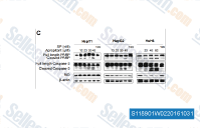
|
|
| S1537 | Vadimezan (DMXAA) | Vadimezan (DMXAA) is a vascular disrupting agents (VDA) and competitive inhibitor of DT-diaphorase with Ki of 20 μM and IC50 of 62.5 μM in cell-free assays, respectively. DMXAA (Vadimezan) is also a STING agonist with potential antineoplastic activity. DMXAA (Vadimezan) potently induces IFN-β but relatively low TNF-α expression in vitro. DMXAA (Vadimezan) has antiviral activity. Phase 3. |
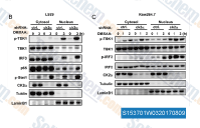
|
|
| S8279 | Shikonin | Shikonin, a potent and specific Pyruvate kinase M2 (PKM2) inhibitor, is a major component of zicao (purple gromwell, the dried root of Lithospermum erythrorhizon), a Chinese herbal medicine with various biological activities. It is also an inhibitor of TMEM16A chloride channel activity using cell-based fluorescent-quenching assay. Shikonin exerts an anti-inflammatory effect by inhibiting tumor necrosis factor-α (TNF-α) and prevents activation of nuclear factor-κB (NF-κB) pathway via proteasome inhibition. | ||
| S1193 | Thalidomide | Thalidomide was introduced as a sedative drug, immunomodulatory agent and also is investigated for treating symptoms of many cancers. Thalidomide inhibits cereblon (CRBN), a part of the cullin-4 E3 ubiquitin ligase complex CUL4-RBX1-DDB1. |
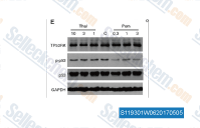
|
|
| S7963 | TIC10 (ONC201) | TIC10 (ONC201) inactivates Akt and ERK to induce TNF-related apoptosis-inducing ligand (TRAIL) through Foxo3a, possesses superior drug properties: delivery across the blood-brain barrier, superior stability and improved pharmacokinetics. Phase 1/2. |
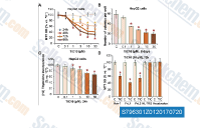
|
|
| S8133 | Resiquimod (R-848) | Resiquimod (R-848, S28463) is an immune response modifier that acts as a potent TLR 7/TLR 8 agonist that induces the upregulation of cytokines such as TNF-α, IL-6 and IFN-α. Resiquimod reduces hepatitis C virus (HCV) infection. Phase 2. | ||
| A2010 | Adalimumab (anti-TNF-alpha) | Adalimumab is the first fully human, recombinant IgG1 monoclonal antibody that specifically targets human TNF-alpha, MW: 144.19 KD. | ||
| S8034 | Apremilast | Apremilast (CC-10004) is a potent and orally active PDE4 and TNF-α inhibitor with IC50 of 74 nM and 77 nM, respectively. | ||
| S6643 | R-7050 | R-7050 is a cell permeable TNF-α receptor antagonist and is 2.3-fold more selective for TNF-α-mediated signaling than for that driven by IL-1β. | ||
| S4238 | Cepharanthine | Cepharanthine (NSC-623442) is a biscoclaurine alkaloid inhibiting tumor necrosis factor (TNF)-α-mediated NFκB stimulation, plasma membrane lipid peroxidation and platelet aggregation and suppressing cytokine production. | ||
| S8484 | GSK2982772 | GSK2982772 is an ATP competitive receptor-interacting protein-1 (RIP1) kinase inhibitor with the IC50 value of 1 nM. It has exquisite kinase specificity and excellent activity in blocking many TNF-dependent cellular responses. | ||
| A2019 | Infliximab (anti-TNF-alpha) | Infliximab (anti-TNF-alpha) is a purified, recombinant DNA-derived chimeric human-mouse IgG monoclonal antibody that consists of mouse heavy and light chain variable regions combined with human heavy and light chain constant regions. Infliximab neutralizes the biological activity of TNF-α by binding with high affinity to the soluble and transmembrane forms of TNF-α, and inhibits or prevents the effective binding of TNF-α with its receptors. MW=144.2 kDa. | ||
| S3924 | Ginsenoside Rb1 | Ginsenoside Rb1 (Gypenoside Ⅲ) is a protopanaxadiol that has diverse in vitro and in vivo effects, including neuroprotective, anti-inflammatory, and anti-obesity actions. Ginsenoside Rb1, a main constituent of the root of Panax ginseng, inhibits Na+, K+-ATPase activity with IC50 of 6.3±1.0 μM. Ginsenoside also inhibits IRAK-1 activation and phosphorylation of NF-κB p65. Ginsenoside Rb1 reduces the expressions of TLR3, TLR4 and TRAF-6, and down-regulates the levels of TNF-α, IFN-β and iNOS. | ||
| S8261 | GSK583 | GSK583 is a highly potent and selective inhibitor of RIP2 kinase with IC50 of 5 nM. GSK583 also inhibits both TNF-α and IL-6 production with IC50 of ~200 nM in explant cultures. | ||
| S0787 | 3-Deazaadenosine hydrochloride | 3-Deazaadenosine HCl (3-DZA, c3Ado) is a potent inhibitor of S-adenosylhomocysteine hydrolase with Ki of 3.9 µM. 3-Deazaadenosine HCl inhibits bacterial lipopolysaccharide-induced transcription of TNF-α and IL-1β. 3-Deazaadenosine HCl inhibits the transcriptional activity of NF-κB, prevents FCS-induced Ras carboxyl methylation and reduces FCS-induced ERK1/2 and Akt phosphorylation. 3-Deazaadenosine HCl has anti-inflammatory, anti-proliferative and anti-HIV activities. | ||
| S3292 | Falcarindiol | Falcarindiol (FAD, (3R,8S)-Falcarindiol, FaDOH) is a natural polyacetylene compound found rich in many plants of the Umbelliferae family. Falcarindiol suppresses LPS-stimulated expression of inducible nitric oxide synthase (iNOS), tumor necrosis factor alpha (TNFα), interleukin-6 (IL-6), and interleukin-1 beta (IL-1β). Falcarindiol attenuates the LPS-induced activation of JNK, ERK, STAT1, and STAT3 signaling molecules. | ||
| S3865 | Taurochenodeoxycholic acid | Taurochenodeoxycholic acid (Taurochenodeoxycholate, TCDCA, Chenodeoxycholyltaurine), a bile acid formed in the liver of most species, is used as a cholagogue and choleretic. | ||
| S2979 | CU-T12-9 | CU-T12-9 is a specific agonist of Toll-like receptor (TLR) 1/2 with EC50 of 52.9 nM in HEK-Blue hTLR2 SEAP assay. CU-T12-9 activates both the innate and the adaptive immune systems. CU-T12-9 signals through NF-κB and invokes an elevation of the downstream effectors TNF-α, IL-10, and iNOS. | ||
| S7942 | Bioymifi | Bioymifi, a small-molecule death receptor 5 (DR5) agonist, binds to the extracellular domain(ECD) of DR5 with a Kd of 1.2 μM but showed little binding affinity to the DR4 ECD. It induces DR5 clustering and aggregation, leading to apoptosis. | ||
| S9374 | 2',5'-Dihydroxyacetophenone | 2',5'-Dihydroxyacetophenone (DHAP, 2-Acetylhydroquinone, Quinacetophenone) is a mixture of dihydroxyacetophenone isomers is used in food flavouring. 2',5'-Dihydroxyacetophenone significantly inhibits NO production via the suppression of iNOS expression. 2',5'-Dihydroxyacetophenone significantly decreases levels of the pro-inflammatory cytokines TNF-α and IL-6 by blocking the ERK1/2 and NF-κB signaling pathways. | ||
| S9396 | Geraniin | Geraniin, a hydrolysable polyphenol derived from Nephelium lappaceum L. fruit rind, has been shown to possess significant antioxidant activity in vitro. | ||
| S2465 | CPI-1189 | CPI-1189 (REN 1654, REN 1189) is the proapoptotic cytokine tumor necrosis factor (TNF) alpha inhibitor. CPI-1189 intracellularly inhibits the p38 mitogen-activated protein kinase phosphoactivation and shows neuroprotective effects. | ||
| S9502 | Madecassic acid | Madecassic acid (Brahmic acid), a natural triterpene first isolated from C. asiatica, has diverse anti-inflammatory and anti-diabetic effects, blocking NF-κB activation in macrophages and causing by iNOS, COX-2, TNF-alpha, IL-1beta and IL-6 inhibition. | ||
| F0106New | SQSTM1 / p62 Rabbit mAb | SQSTM1 / p62 Rabbit mAb recognizes endogenous levels of total SQSTM1/p62 protein. | ||
| F0414New | TNF-R1 Rabbit mAb | TNF-R1 Rabbit mAb recognizes endogenous levels of human TNF-R1 protein. This antibody does not appear to cross-react with other related family members. This antibody may recognize a 30 kDa splice isoform of TNF-R1 in some cell lines. | ||
| F0369New | A20/TNFAIP3 Rabbit mAb | A20/TNFAIP3 Rabbit mAb recognizes endogenous levels of total A20/TNFAIP3 protein. | ||
| F0476New | DR5 Rabbit mAb | |||
| S1833 | Butoconazole nitrate | Butoconazole nitrate (RS-35887) is an anti-fungal agent that inhibits PHA-stimulated release of cytokines-- IL-2, TNFα, IFN and GM-CSF from human peripheral blood lymphocytes (IC50 of 7.2 μg/mL, 14.4 μg/mL, 7.36 μg/mL and 7.6 μg/mL, respectively). | ||
| E5778New | CU-CPT 4a | CU-CPT 4a (TLR3-IN-1) is a potent small molecule antagonist of TLR3 with an IC50 of 3.44 µM that also inhibits TLR3/dsRNA-mediated signaling, including TNF-α and IL-1β expression. It is a valuable tool for studying protein-RNA complexes. | ||
| S3236 | Mesaconitine | Mesaconitine, one of the aconite alkaloids in Aconiti tuber, increases the [Ca2+]i level in endothelial cells by influx of Ca2+ from extracellular spaces. | ||
| E0314 | JTE-607 Dihydrochloride | JTE-607 Dihydrochloride is a prodrug compound that is converted to an active form by ester hydrolysis. JTE-607 is a multiple cytokine production inhibitor that targets CPSF3 and inhibits pre-mRNA processing. JTE-607 inhibits tumor necrosis factor (TNF)-alpha, interleukin (IL)-1beta, IL-6, IL-8 and IL-10, from LPS-stimulated human PBMCs, with IC50 values of 11 nM, 5.9 nM, 8.8 nM, 7.3 nM and 9.1 nM, respectively. |
||
| S3231 | UCB-9260 | UCB-9260 is an orally active inhibitor that inhibits TNF signalling by stabilising an asymmetric form of the trimer. UCB-9260 binds TNF with Kd of 13 nM. UCB-9260 also inhibits NF-κB with IC50 of 202 nM after TNF stimulation. | ||
| S0949 | Cucurbitacin IIb | Cucurbitacin IIb (CuIIb, Dihydrocucurbitacin F, 25-deacetyl hemslecin A) inhibits phosphorylation of STAT3, JNK and Erk1/2, enhances the phosphorylation of IκB and NF-κB, blocks nuclear translocation of NF-κB and decreases mRNA levels of IκBα and TNF-α. Cucurbitacin IIb exhibits anti-inflammatory activity and induces apoptosis. Cucurbitacin IIb is isolated from Hemsleya amabilis. | ||
| S0752 | AUDA | AUDA (compound 43) is a potent inhibitor of soluble epoxide hydrolase (sEH) with IC50 of 18 nM and 69 nM for the mouse sEH and human sEH, respectively. AUDA has anti-inflammatory activity that reduces the protein expression of MMP-9, IL-1β, TNF-α and TGF-β. AUDA downregulates Smad3 and p38 signaling pathways. | ||
| S0777 | Isuzinaxib (APX-115 free base) | APX-115 free base (Ewha-18278 free base) is a potent, orally active inhibitor of pan NADPH oxidase (pan-Nox) with Ki of 1.08 μM, 0.57 μM, and 0.63 μM for Nox1, Nox2 and Nox4, respectively. APX-115 free base (Ewha-18278 free base) significantly suppresses the expression of inflammatory molecules including MCP-1/CCL2, IL-6, and TNFα in the diabetic kidney. | ||
| S0781 | IQ 3 | IQ 3 is a specific c-Jun N-terminal kinase (JNK) inhibitor with Kd of 66 nM, 240 nM and 290 nM for JNK3, JNK1 and JNK2, respectively. IQ 3 inhibits LPS-induced NF-κB/AP1 transcriptional activity in THP1-Blue cells with IC50 of 1.4 μM. IQ 3 also inhibits TNF-α and IL-6 production in vitro. | ||
| S3515 | Benpyrine racemate | Benpyrine racemate ((Rac)-Benpyrine) is a potent, highly specific and orally active inhibitor of TNF-α and attenuates TNF-α-induced inflammation, thereby reducing liver and lung injury. | ||
| A2892 | Golimumab (Anti-TNFSF2 / TNFa) | Golimumab (Anti-TNFSF2 / TNFa) is a human monoclonal antibody directed against the pro-inflammatory cytokine tumor necrosis factor-alpha (TNF-a) with immunosuppressive activity. MW: 146.94 KD. | ||
| E6029New | Lenalidomide hemihydrate | Lenalidomide hemihydrate (CC-5013 hemihydrate) is a potent inhibitor of TNF-alpha with a IC50 of 13 nM. It induces tyrosine phosphorylation of CD28 on T cells, which subsequently activates NF-κB. It acts as a ligand for the ubiquitin E3 ligase cereblon (CRBN), leading to the selective ubiquitination and degradation of the lymphoid transcription factors IKZF1 and IKZF3 through the CRBN-CRL4 ubiquitin ligase complex. | ||
| S3540 | UTL-5g | UTL-5g (GBL-5g) is a novel small-molecule TNF-α inhibitor which can lower hepatotoxicity, nephrotoxicity and myelotoxicity induced by Cisplatin. | ||
| S3293 | Gardenoside | Gardenoside is a natural compound extracted from Gardenia fruits, with hepatoprotective properties. Gardenoside inhibits TNF-α, IL-1β, IL-6 and NFκB activation. Gardenoside also has an inhibitory effect on free fatty acids (FFA)-induced cellular steatosis. Gardenoside suppresses the pain in rats model of chronic constriction injury by regulating the P2X3 and P2X7 receptors. | ||
| S0139 | MD2-TLR4-IN-1 | MD2-TLR4-IN-1 (Compound 22m) is a potent inhibitor of myeloid differentiation protein 2/toll-like receptor 4 (MD2-TLR4). MD2-TLR4-IN-1 (compound 22m) inhibits lipopolysaccharide (LPS)-induced expression of tumor necrosis factor alpha (TNF-α) and interleukin-6 (IL-6) in macrophages with IC50 of 0.89 μM and 0.53 μM, respectively. | ||
| S3871 | Muscone | Muscone (3-Methylcyclopentadecanone, Methylexaltone), a flavouring ingredient, is an organic compound that is the primary contributor to the odor of musk and also a potent anti-inflammatory agent. Muscone significantly downregulats the levels of LPS-induced inflammatory cytokines and inhibits NF-κB and NLRP3 inflammasome activation in BMDMs. Muscone remarkably decreases the levels of inflammatory cytokines (IL-1β, TNF-α and IL-6). | ||
| S9075 | Mulberroside A | Mulberroside A, isolated from the ethanol extract of Morus alba roots, is widely employed as an active ingredient in cosmetic products due to its anti-tyrosinase and anti-oxidant activities. Mulberroside A decreases the expressions of TNF-α, IL-1β and IL-6 and inhibits the activation of NALP3, caspase-1 and NF-κB and the phosphorylation of ERK, JNK and p38. | ||
| S9090 | Corilagin | Corilagin, discovered in many medicinal plants such as Phyllanthus speices etc., has multiple activities including anti-oxidative, anti-inflammatory, anti-apoptotic, hepatoprotective and others. It is an inhibitor of TNF-α. | ||
| S6850 | NE 52-QQ57 | NE 52-QQ57 is a selective, and orally available antagonist of G-protein coupled receptor 4 (GPR4) with IC50 of 0.07 μM. NE 52-QQ57 effectively blocks GPR4-mediated cAMP accumulation with IC50 of 26.8 nM in HEK293 cells. The antagonism of GPR4 with NE 52-QQ57 significantly inhibits the AGE-induced increased expression of several key inflammatory cytokines and signaling molecules, including tumor necrosis factor-α (TNF-α), interleukin (IL)-1β, IL-6, inducible nitric oxide synthase (iNOS), nitric oxide (NO), cyclooxygenase 2 (COX2), and prostaglandin E2 (PGE2). | ||
| A2124 | Anti-mouse TNFα-InVivo | Anti-mouse TNFα-InVivo reacts with mouse TNFα (tumor necrosis factor-alpha), a multifunctional proinflammatory cytokine. TNFα dysregulation is been implicated in a variety of diseases, including autoimmune diseases, insulin resistance, and cancer. TNFα knockout animals display defects in response to bacterial infection, characterized by defects in forming organized follicular dendritic cell networks and germinal centers with a lack of primary B cell follicles. | ||
| S9417 | Homoplantaginin | Homoplantaginin (Hispidulin-7-glucoside), a main flavonoid from a traditional Chinese medicine Salvia plebeia, has anti-inflammatory and anti-oxidant properties. Homoplantaginin inhibits TNF-α and IL-6 mRNA expression, IKKβ and NF-κB phosphorylation. | ||
| E2630 | SKF-86002 | SKF-86002 is an orally active p38 MAPK inhibitor, inhibits lipopolysaccharide (LPS)-stimulate human monocyte IL-1 and TNF-α production with IC50 of 1 μM, also inhibits lipoxygenase- and cyclooxygenase-mediated metabolism of arachidonic acid. | ||
| S5584 | Citronellol | Citronellol (Dihydrogeraniol, (±)-β-Citronellol), a constituent of rose and geranium oils, is used in perfumes and insect repellents. Citronellol can cause necrotic apoptosis of NCI-H1299 cells by up-regulating TNF-α, RIP1 / RIP3 activities, and down-regulating caspase-3 / caspase-8 activities. Citronellol also results in a biphasic increase in ROS production at 1 h and at 12 h in NCI-H1299 cells. | ||
| S8224 | PF-3644022 | PF-3644022 is a potent freely reversible ATP-competitive inhibitor of MAPKAPK2 (MK2) with an Ki of 3 nM. PF-3644022 also potently inhibits TNFα production with an IC50 of 160 nM. | ||
| S6347 | 5'-N-Ethylcarboxamidoadenosine (NECA) | 5'-N-Ethylcarboxamidoadenosine (NECA, 5'-(N-Ethylcarboxamido)adenosine, Adenosine-5'N-ethylcarboxamide, 5'-Ethylcarboxamidoadenosine) is a stable, nonselective adenosine receptor agonist. 5'-N-Ethylcarboxamidoadenosine acts via multiple mechanisms including: reducing diabetes-induced oxidative stress, inhibiting gene expression of IL-18, TNF-α and ICAM-1 (intercellular adhesion molecule 1 (CD54)), and blocking activation of the JNK-MAPK pathway. | ||
| S9129 | 20(S)-Ginsenoside Rh1 | 20(S)-Ginsenoside Rh1 (Prosapogenin A2, Sanchinoside B2, Sanchinoside Rh1) is one of major bioactive compounds extracted from red ginseng, which has been increasingly used for enhancing cognition and physical health worldwide. It exhibits potent characteristics of anti-inflammatory, antioxidant, immunomodulatory effects, and positive effects on the nervous system. Ginsenoside Rh1 inhibits the expression of PPAR-γ, TNF-α, IL-6, and IL-1β. | ||
| S3138 | Methylthiouracil | Methylthiouracil (NSC-193526, NSC-9378,MTU) is an antithyroid agent. Methylthiouracil suppresses the production TNF-α and IL-6, and the activation of NF-κB and ERK1/2. | ||
| P1240New | Etanercept | Etanercept, a dimeric fusion protein, functions as an inhibitor of TNF by binding to TNF. It competitively blocks the attachment of both TNF-α and TNF-β to their cell surface receptors, thereby neutralizing TNF's biological activity. Etanercept has proven effectiveness in treating rheumatoid arthritis, juvenile idiopathic arthritis, and plaque psoriasis. | ||
| S6727 | AX-024 HCl | AX-024 HCl blocks the interaction of the CD3ε PRS with SH3.1(Nck). AX-024 HCl also inhibits IL-6, TNF-α, IFN-γ, IL-10 and IL-17A. | ||
| S5851 | 4'-Methoxychalcone | 4'-Methoxychalcone, found in citrus, is chalcone derivative that has shown diverse pharmacological properties, including anti-tumor and anti-inflammatory activities. | ||
| S3261 | Myrislignan | Myrislignan, a lignan isolated from Myristica fragrans Houtt, possesses anti-inflammatory activities. Myrislignan inhibits interleukin-6 (IL-6) and tumour necrosis factor-α (TNF-α). Myrislignan significantly inhibits the expressions of inducible NO synthase (iNOS) and cyclooxygenase-2 (COX-2) dose-dependently in LPS-stimulated macrophage cells. Myrislignan inhibits the NF-κB signalling pathway activation. | ||
| E0130 | Apigenin-7-O-glucuronide | Apigenin-7-O-glucuronide (Apigenin-7-glucuronide) is the major flavonoid found in milk thistle. Apigenin 7-o-glucuronide inhibits tumor necrosis factor alpha (TNF-α) and total nitrite release in lipopolysaccharide-activated macrophages. | ||
| S1273 | Amarogentin | Amarogentin (AG), a secoiridoid glycoside mainly extracted from Swertia and Gentiana roots, exhibits anti-oxidative, anti-tumour, and anti-diabetic activities. Amarogentin is an agonist for the bitter taste receptor TAS2R1 and inhibits in LAD-2 cells substance P-induced production of newly synthesized TNF-α. Amarogentin induces apoptosis in human gastric cancer cells (SNU-16) through G2/M cell cycle arrest and PI3K/Akt signalling pathway. Amarogentin (AG) interacts with the α2 subunit of AMP-activated protein kinase (AMPK) and activates the trimeric kinase with EC50 of 277 pM. |
||
| S3304 | Stylopine | Stylopine ((R,S)-Stylopine, Tetrahydrocoptisine) reduces nitric oxide (NO), prostaglandin E2 (PGE2), tumor necrosis factor-alpha (TNF-alpha) and interleukin-1beta (IL-1beta), and the IL-6 production and cyclooxygenase-2 (COX-2) activity caused by the LPS stimulation. Stylopine is a major component of the leaf of Chelidonium majus L. | ||
| A2798 | Certolizumab (Anti-TNFSF2 / TNFa) | Certolizumab (anti-TNFSF2 / TNFa) is a Fab fragment of a recombinant, humanized monoclonal antibody directed against the proinflammatory cytokine tumor necrosis factor-alpha (TNF-alpha) with anti-inflammatory activity. MW: 144.92 kD. | ||
| S9184 | Forsythoside B | Forsythoside B is a phenylethanoid glycoside isolated from the leaves of Lamiophlomis rotata Kudo, a Chinese folk medicinal plant. Forsythoside B has potent neuroprotective effects and has anti-inflammation, antioxidant, and antisepsis properties. Forsythoside B could inhibit TNF-alpha, IL-6, IκB and modulate NF-κB. | ||
| S3299 | Demethyleneberberine | Demethyleneberberine (DMB), a component of Cortex Phellodendri Chinensis (CPC), significantly alleviates the weight loss and diminishes myeloperoxidase (MPO) activity, while significantly reduces the production of pro-inflammatory cytokines, such as interleukin (IL)-6 and tumor necrosis factor-α (TNF-α), and inhibits the activation of NF-κB signaling pathway. Demethyleneberberine (DMB) potentially ameliorates NAFLD (Non-alcoholic fatty liver disease) by activating AMPK pathways. | ||
| S8133 | Resiquimod (R-848) | Resiquimod (R-848, S28463) is an immune response modifier that acts as a potent TLR 7/TLR 8 agonist that induces the upregulation of cytokines such as TNF-α, IL-6 and IFN-α. Resiquimod reduces hepatitis C virus (HCV) infection. Phase 2. | ||
| S7942 | Bioymifi | Bioymifi, a small-molecule death receptor 5 (DR5) agonist, binds to the extracellular domain(ECD) of DR5 with a Kd of 1.2 μM but showed little binding affinity to the DR4 ECD. It induces DR5 clustering and aggregation, leading to apoptosis. | ||
| E2630 | SKF-86002 | SKF-86002 is an orally active p38 MAPK inhibitor, inhibits lipopolysaccharide (LPS)-stimulate human monocyte IL-1 and TNF-α production with IC50 of 1 μM, also inhibits lipoxygenase- and cyclooxygenase-mediated metabolism of arachidonic acid. | ||
| S8037 | Necrostatin-1 | Necrostatin-1 (Nec-1) is a specific RIP1 (RIPK1) inhibitor and inhibits TNF-α-induced necroptosis with EC50 of 490 nM in 293T cells. Necrostatin-1 also blocks IDO and suppresses autophagy and apoptosis. |

|
|
| S1623 | Acetylcysteine (N-acetylcysteine) | Acetylcysteine (N-acetyl-l-cysteine, NAC,N-acetylcysteine) is a ROS(reactive oxygen species) inhibitor that antagonizes the activity of proteasome inhibitors. It is also a tumor necrosis factor production inhibitor. Acetylcysteine(N-acetyl-l-cysteine) suppresses TNF-induced NF-κB activation through inhibition of IκB kinases. Acetylcysteine(N-acetyl-l-cysteine) induces apoptosis via the mitochondria-dependent pathway. Acetylcysteine(N-acetyl-l-cysteine) inhibits ferroptosis and virus replication.Solutions are unstable and should be fresh-prepared. |

|
|
| S1029 | Lenalidomide | Lenalidomide is a TNF-α secretion inhibitor with IC50 of 13 nM in PBMCs. Lenalidomide (CC-5013) is a ligand of ubiquitin E3 ligase cereblon (CRBN), and it causes selective ubiquitination and degradation of two lymphoid transcription factors, IKZF1 and IKZF3, by the CRBN-CRL4 ubiquitin ligase. Lenalidomide promotes cleaved caspase-3 expression and inhibit VEGF expression and induces apoptosis. |

|
|
| S4902 | QNZ (EVP4593) | QNZ (EVP4593) shows potent inhibitory activity toward both NF-κB activation and TNF-α production with IC50 of 11 nM and 7 nM in Jurkat T cells, respectively. |

|
|
| S1567 | Pomalidomide | Pomalidomide inhibits LPS-induced TNF-α release with IC50 of 13 nM in PBMCs. Pomalidomide can be utilized in PROTAC as a ligand for targeting E3 ligase and inhibiting the E3 ligase protein cereblon (CRBN). Pomalidomide promotes apoptosis and cell cycle arrest. |

|
|
| S7455 | Resatorvid (TAK-242) | Resatorvid (TAK-242, CLI-095) is a small-molecule-specific inhibitor of Toll-like receptor (TLR) 4 signaling, blocking LPS-induced production of NO, TNF-α and IL-6 in macrophages with IC50 of 1.8 nM, 1.9 nM and 1.3 nM, respectively. Resatorvid downregulates expression of TLR4 downstream signaling molecules MyD88 and TRIF. Resatorvid inhibits autophagy. | ||
| S1189 | Aprepitant | Aprepitant is a potent and selective neurokinin-1 receptor antagonist with IC50 of 0.1 nM. Aprepitant reduces levels of pro-inflammatory cytokines including G-CSF, IL-6, IL-8 and TNFα. Aprepitant inhibits HIV infection of human macrophages. |

|
|
| S8279 | Shikonin | Shikonin, a potent and specific Pyruvate kinase M2 (PKM2) inhibitor, is a major component of zicao (purple gromwell, the dried root of Lithospermum erythrorhizon), a Chinese herbal medicine with various biological activities. It is also an inhibitor of TMEM16A chloride channel activity using cell-based fluorescent-quenching assay. Shikonin exerts an anti-inflammatory effect by inhibiting tumor necrosis factor-α (TNF-α) and prevents activation of nuclear factor-κB (NF-κB) pathway via proteasome inhibition. | ||
| S1193 | Thalidomide | Thalidomide was introduced as a sedative drug, immunomodulatory agent and also is investigated for treating symptoms of many cancers. Thalidomide inhibits cereblon (CRBN), a part of the cullin-4 E3 ubiquitin ligase complex CUL4-RBX1-DDB1. |

|
|
| S8034 | Apremilast | Apremilast (CC-10004) is a potent and orally active PDE4 and TNF-α inhibitor with IC50 of 74 nM and 77 nM, respectively. | ||
| S4238 | Cepharanthine | Cepharanthine (NSC-623442) is a biscoclaurine alkaloid inhibiting tumor necrosis factor (TNF)-α-mediated NFκB stimulation, plasma membrane lipid peroxidation and platelet aggregation and suppressing cytokine production. | ||
| S8484 | GSK2982772 | GSK2982772 is an ATP competitive receptor-interacting protein-1 (RIP1) kinase inhibitor with the IC50 value of 1 nM. It has exquisite kinase specificity and excellent activity in blocking many TNF-dependent cellular responses. | ||
| S3924 | Ginsenoside Rb1 | Ginsenoside Rb1 (Gypenoside Ⅲ) is a protopanaxadiol that has diverse in vitro and in vivo effects, including neuroprotective, anti-inflammatory, and anti-obesity actions. Ginsenoside Rb1, a main constituent of the root of Panax ginseng, inhibits Na+, K+-ATPase activity with IC50 of 6.3±1.0 μM. Ginsenoside also inhibits IRAK-1 activation and phosphorylation of NF-κB p65. Ginsenoside Rb1 reduces the expressions of TLR3, TLR4 and TRAF-6, and down-regulates the levels of TNF-α, IFN-β and iNOS. | ||
| S8261 | GSK583 | GSK583 is a highly potent and selective inhibitor of RIP2 kinase with IC50 of 5 nM. GSK583 also inhibits both TNF-α and IL-6 production with IC50 of ~200 nM in explant cultures. | ||
| S0787 | 3-Deazaadenosine hydrochloride | 3-Deazaadenosine HCl (3-DZA, c3Ado) is a potent inhibitor of S-adenosylhomocysteine hydrolase with Ki of 3.9 µM. 3-Deazaadenosine HCl inhibits bacterial lipopolysaccharide-induced transcription of TNF-α and IL-1β. 3-Deazaadenosine HCl inhibits the transcriptional activity of NF-κB, prevents FCS-induced Ras carboxyl methylation and reduces FCS-induced ERK1/2 and Akt phosphorylation. 3-Deazaadenosine HCl has anti-inflammatory, anti-proliferative and anti-HIV activities. | ||
| S3292 | Falcarindiol | Falcarindiol (FAD, (3R,8S)-Falcarindiol, FaDOH) is a natural polyacetylene compound found rich in many plants of the Umbelliferae family. Falcarindiol suppresses LPS-stimulated expression of inducible nitric oxide synthase (iNOS), tumor necrosis factor alpha (TNFα), interleukin-6 (IL-6), and interleukin-1 beta (IL-1β). Falcarindiol attenuates the LPS-induced activation of JNK, ERK, STAT1, and STAT3 signaling molecules. | ||
| S9374 | 2',5'-Dihydroxyacetophenone | 2',5'-Dihydroxyacetophenone (DHAP, 2-Acetylhydroquinone, Quinacetophenone) is a mixture of dihydroxyacetophenone isomers is used in food flavouring. 2',5'-Dihydroxyacetophenone significantly inhibits NO production via the suppression of iNOS expression. 2',5'-Dihydroxyacetophenone significantly decreases levels of the pro-inflammatory cytokines TNF-α and IL-6 by blocking the ERK1/2 and NF-κB signaling pathways. | ||
| S9396 | Geraniin | Geraniin, a hydrolysable polyphenol derived from Nephelium lappaceum L. fruit rind, has been shown to possess significant antioxidant activity in vitro. | ||
| S2465 | CPI-1189 | CPI-1189 (REN 1654, REN 1189) is the proapoptotic cytokine tumor necrosis factor (TNF) alpha inhibitor. CPI-1189 intracellularly inhibits the p38 mitogen-activated protein kinase phosphoactivation and shows neuroprotective effects. | ||
| S9502 | Madecassic acid | Madecassic acid (Brahmic acid), a natural triterpene first isolated from C. asiatica, has diverse anti-inflammatory and anti-diabetic effects, blocking NF-κB activation in macrophages and causing by iNOS, COX-2, TNF-alpha, IL-1beta and IL-6 inhibition. | ||
| S1833 | Butoconazole nitrate | Butoconazole nitrate (RS-35887) is an anti-fungal agent that inhibits PHA-stimulated release of cytokines-- IL-2, TNFα, IFN and GM-CSF from human peripheral blood lymphocytes (IC50 of 7.2 μg/mL, 14.4 μg/mL, 7.36 μg/mL and 7.6 μg/mL, respectively). | ||
| E5778New | CU-CPT 4a | CU-CPT 4a (TLR3-IN-1) is a potent small molecule antagonist of TLR3 with an IC50 of 3.44 µM that also inhibits TLR3/dsRNA-mediated signaling, including TNF-α and IL-1β expression. It is a valuable tool for studying protein-RNA complexes. | ||
| S3236 | Mesaconitine | Mesaconitine, one of the aconite alkaloids in Aconiti tuber, increases the [Ca2+]i level in endothelial cells by influx of Ca2+ from extracellular spaces. | ||
| E0314 | JTE-607 Dihydrochloride | JTE-607 Dihydrochloride is a prodrug compound that is converted to an active form by ester hydrolysis. JTE-607 is a multiple cytokine production inhibitor that targets CPSF3 and inhibits pre-mRNA processing. JTE-607 inhibits tumor necrosis factor (TNF)-alpha, interleukin (IL)-1beta, IL-6, IL-8 and IL-10, from LPS-stimulated human PBMCs, with IC50 values of 11 nM, 5.9 nM, 8.8 nM, 7.3 nM and 9.1 nM, respectively. |
||
| S3231 | UCB-9260 | UCB-9260 is an orally active inhibitor that inhibits TNF signalling by stabilising an asymmetric form of the trimer. UCB-9260 binds TNF with Kd of 13 nM. UCB-9260 also inhibits NF-κB with IC50 of 202 nM after TNF stimulation. | ||
| S0949 | Cucurbitacin IIb | Cucurbitacin IIb (CuIIb, Dihydrocucurbitacin F, 25-deacetyl hemslecin A) inhibits phosphorylation of STAT3, JNK and Erk1/2, enhances the phosphorylation of IκB and NF-κB, blocks nuclear translocation of NF-κB and decreases mRNA levels of IκBα and TNF-α. Cucurbitacin IIb exhibits anti-inflammatory activity and induces apoptosis. Cucurbitacin IIb is isolated from Hemsleya amabilis. | ||
| S0752 | AUDA | AUDA (compound 43) is a potent inhibitor of soluble epoxide hydrolase (sEH) with IC50 of 18 nM and 69 nM for the mouse sEH and human sEH, respectively. AUDA has anti-inflammatory activity that reduces the protein expression of MMP-9, IL-1β, TNF-α and TGF-β. AUDA downregulates Smad3 and p38 signaling pathways. | ||
| S0777 | Isuzinaxib (APX-115 free base) | APX-115 free base (Ewha-18278 free base) is a potent, orally active inhibitor of pan NADPH oxidase (pan-Nox) with Ki of 1.08 μM, 0.57 μM, and 0.63 μM for Nox1, Nox2 and Nox4, respectively. APX-115 free base (Ewha-18278 free base) significantly suppresses the expression of inflammatory molecules including MCP-1/CCL2, IL-6, and TNFα in the diabetic kidney. | ||
| S0781 | IQ 3 | IQ 3 is a specific c-Jun N-terminal kinase (JNK) inhibitor with Kd of 66 nM, 240 nM and 290 nM for JNK3, JNK1 and JNK2, respectively. IQ 3 inhibits LPS-induced NF-κB/AP1 transcriptional activity in THP1-Blue cells with IC50 of 1.4 μM. IQ 3 also inhibits TNF-α and IL-6 production in vitro. | ||
| S3515 | Benpyrine racemate | Benpyrine racemate ((Rac)-Benpyrine) is a potent, highly specific and orally active inhibitor of TNF-α and attenuates TNF-α-induced inflammation, thereby reducing liver and lung injury. | ||
| E6029New | Lenalidomide hemihydrate | Lenalidomide hemihydrate (CC-5013 hemihydrate) is a potent inhibitor of TNF-alpha with a IC50 of 13 nM. It induces tyrosine phosphorylation of CD28 on T cells, which subsequently activates NF-κB. It acts as a ligand for the ubiquitin E3 ligase cereblon (CRBN), leading to the selective ubiquitination and degradation of the lymphoid transcription factors IKZF1 and IKZF3 through the CRBN-CRL4 ubiquitin ligase complex. | ||
| S3540 | UTL-5g | UTL-5g (GBL-5g) is a novel small-molecule TNF-α inhibitor which can lower hepatotoxicity, nephrotoxicity and myelotoxicity induced by Cisplatin. | ||
| S3293 | Gardenoside | Gardenoside is a natural compound extracted from Gardenia fruits, with hepatoprotective properties. Gardenoside inhibits TNF-α, IL-1β, IL-6 and NFκB activation. Gardenoside also has an inhibitory effect on free fatty acids (FFA)-induced cellular steatosis. Gardenoside suppresses the pain in rats model of chronic constriction injury by regulating the P2X3 and P2X7 receptors. | ||
| S0139 | MD2-TLR4-IN-1 | MD2-TLR4-IN-1 (Compound 22m) is a potent inhibitor of myeloid differentiation protein 2/toll-like receptor 4 (MD2-TLR4). MD2-TLR4-IN-1 (compound 22m) inhibits lipopolysaccharide (LPS)-induced expression of tumor necrosis factor alpha (TNF-α) and interleukin-6 (IL-6) in macrophages with IC50 of 0.89 μM and 0.53 μM, respectively. | ||
| S3871 | Muscone | Muscone (3-Methylcyclopentadecanone, Methylexaltone), a flavouring ingredient, is an organic compound that is the primary contributor to the odor of musk and also a potent anti-inflammatory agent. Muscone significantly downregulats the levels of LPS-induced inflammatory cytokines and inhibits NF-κB and NLRP3 inflammasome activation in BMDMs. Muscone remarkably decreases the levels of inflammatory cytokines (IL-1β, TNF-α and IL-6). | ||
| S9075 | Mulberroside A | Mulberroside A, isolated from the ethanol extract of Morus alba roots, is widely employed as an active ingredient in cosmetic products due to its anti-tyrosinase and anti-oxidant activities. Mulberroside A decreases the expressions of TNF-α, IL-1β and IL-6 and inhibits the activation of NALP3, caspase-1 and NF-κB and the phosphorylation of ERK, JNK and p38. | ||
| S9090 | Corilagin | Corilagin, discovered in many medicinal plants such as Phyllanthus speices etc., has multiple activities including anti-oxidative, anti-inflammatory, anti-apoptotic, hepatoprotective and others. It is an inhibitor of TNF-α. | ||
| S6850 | NE 52-QQ57 | NE 52-QQ57 is a selective, and orally available antagonist of G-protein coupled receptor 4 (GPR4) with IC50 of 0.07 μM. NE 52-QQ57 effectively blocks GPR4-mediated cAMP accumulation with IC50 of 26.8 nM in HEK293 cells. The antagonism of GPR4 with NE 52-QQ57 significantly inhibits the AGE-induced increased expression of several key inflammatory cytokines and signaling molecules, including tumor necrosis factor-α (TNF-α), interleukin (IL)-1β, IL-6, inducible nitric oxide synthase (iNOS), nitric oxide (NO), cyclooxygenase 2 (COX2), and prostaglandin E2 (PGE2). | ||
| S9417 | Homoplantaginin | Homoplantaginin (Hispidulin-7-glucoside), a main flavonoid from a traditional Chinese medicine Salvia plebeia, has anti-inflammatory and anti-oxidant properties. Homoplantaginin inhibits TNF-α and IL-6 mRNA expression, IKKβ and NF-κB phosphorylation. | ||
| S8224 | PF-3644022 | PF-3644022 is a potent freely reversible ATP-competitive inhibitor of MAPKAPK2 (MK2) with an Ki of 3 nM. PF-3644022 also potently inhibits TNFα production with an IC50 of 160 nM. | ||
| S6347 | 5'-N-Ethylcarboxamidoadenosine (NECA) | 5'-N-Ethylcarboxamidoadenosine (NECA, 5'-(N-Ethylcarboxamido)adenosine, Adenosine-5'N-ethylcarboxamide, 5'-Ethylcarboxamidoadenosine) is a stable, nonselective adenosine receptor agonist. 5'-N-Ethylcarboxamidoadenosine acts via multiple mechanisms including: reducing diabetes-induced oxidative stress, inhibiting gene expression of IL-18, TNF-α and ICAM-1 (intercellular adhesion molecule 1 (CD54)), and blocking activation of the JNK-MAPK pathway. | ||
| S9129 | 20(S)-Ginsenoside Rh1 | 20(S)-Ginsenoside Rh1 (Prosapogenin A2, Sanchinoside B2, Sanchinoside Rh1) is one of major bioactive compounds extracted from red ginseng, which has been increasingly used for enhancing cognition and physical health worldwide. It exhibits potent characteristics of anti-inflammatory, antioxidant, immunomodulatory effects, and positive effects on the nervous system. Ginsenoside Rh1 inhibits the expression of PPAR-γ, TNF-α, IL-6, and IL-1β. | ||
| S3138 | Methylthiouracil | Methylthiouracil (NSC-193526, NSC-9378,MTU) is an antithyroid agent. Methylthiouracil suppresses the production TNF-α and IL-6, and the activation of NF-κB and ERK1/2. | ||
| P1240New | Etanercept | Etanercept, a dimeric fusion protein, functions as an inhibitor of TNF by binding to TNF. It competitively blocks the attachment of both TNF-α and TNF-β to their cell surface receptors, thereby neutralizing TNF's biological activity. Etanercept has proven effectiveness in treating rheumatoid arthritis, juvenile idiopathic arthritis, and plaque psoriasis. | ||
| S6727 | AX-024 HCl | AX-024 HCl blocks the interaction of the CD3ε PRS with SH3.1(Nck). AX-024 HCl also inhibits IL-6, TNF-α, IFN-γ, IL-10 and IL-17A. | ||
| S3261 | Myrislignan | Myrislignan, a lignan isolated from Myristica fragrans Houtt, possesses anti-inflammatory activities. Myrislignan inhibits interleukin-6 (IL-6) and tumour necrosis factor-α (TNF-α). Myrislignan significantly inhibits the expressions of inducible NO synthase (iNOS) and cyclooxygenase-2 (COX-2) dose-dependently in LPS-stimulated macrophage cells. Myrislignan inhibits the NF-κB signalling pathway activation. | ||
| E0130 | Apigenin-7-O-glucuronide | Apigenin-7-O-glucuronide (Apigenin-7-glucuronide) is the major flavonoid found in milk thistle. Apigenin 7-o-glucuronide inhibits tumor necrosis factor alpha (TNF-α) and total nitrite release in lipopolysaccharide-activated macrophages. | ||
| S1273 | Amarogentin | Amarogentin (AG), a secoiridoid glycoside mainly extracted from Swertia and Gentiana roots, exhibits anti-oxidative, anti-tumour, and anti-diabetic activities. Amarogentin is an agonist for the bitter taste receptor TAS2R1 and inhibits in LAD-2 cells substance P-induced production of newly synthesized TNF-α. Amarogentin induces apoptosis in human gastric cancer cells (SNU-16) through G2/M cell cycle arrest and PI3K/Akt signalling pathway. Amarogentin (AG) interacts with the α2 subunit of AMP-activated protein kinase (AMPK) and activates the trimeric kinase with EC50 of 277 pM. |
||
| S3304 | Stylopine | Stylopine ((R,S)-Stylopine, Tetrahydrocoptisine) reduces nitric oxide (NO), prostaglandin E2 (PGE2), tumor necrosis factor-alpha (TNF-alpha) and interleukin-1beta (IL-1beta), and the IL-6 production and cyclooxygenase-2 (COX-2) activity caused by the LPS stimulation. Stylopine is a major component of the leaf of Chelidonium majus L. | ||
| S9184 | Forsythoside B | Forsythoside B is a phenylethanoid glycoside isolated from the leaves of Lamiophlomis rotata Kudo, a Chinese folk medicinal plant. Forsythoside B has potent neuroprotective effects and has anti-inflammation, antioxidant, and antisepsis properties. Forsythoside B could inhibit TNF-alpha, IL-6, IκB and modulate NF-κB. | ||
| S3299 | Demethyleneberberine | Demethyleneberberine (DMB), a component of Cortex Phellodendri Chinensis (CPC), significantly alleviates the weight loss and diminishes myeloperoxidase (MPO) activity, while significantly reduces the production of pro-inflammatory cytokines, such as interleukin (IL)-6 and tumor necrosis factor-α (TNF-α), and inhibits the activation of NF-κB signaling pathway. Demethyleneberberine (DMB) potentially ameliorates NAFLD (Non-alcoholic fatty liver disease) by activating AMPK pathways. | ||
| A2010 | Adalimumab (anti-TNF-alpha) | Adalimumab is the first fully human, recombinant IgG1 monoclonal antibody that specifically targets human TNF-alpha, MW: 144.19 KD. | ||
| A2019 | Infliximab (anti-TNF-alpha) | Infliximab (anti-TNF-alpha) is a purified, recombinant DNA-derived chimeric human-mouse IgG monoclonal antibody that consists of mouse heavy and light chain variable regions combined with human heavy and light chain constant regions. Infliximab neutralizes the biological activity of TNF-α by binding with high affinity to the soluble and transmembrane forms of TNF-α, and inhibits or prevents the effective binding of TNF-α with its receptors. MW=144.2 kDa. | ||
| A2892 | Golimumab (Anti-TNFSF2 / TNFa) | Golimumab (Anti-TNFSF2 / TNFa) is a human monoclonal antibody directed against the pro-inflammatory cytokine tumor necrosis factor-alpha (TNF-a) with immunosuppressive activity. MW: 146.94 KD. | ||
| A2124 | Anti-mouse TNFα-InVivo | Anti-mouse TNFα-InVivo reacts with mouse TNFα (tumor necrosis factor-alpha), a multifunctional proinflammatory cytokine. TNFα dysregulation is been implicated in a variety of diseases, including autoimmune diseases, insulin resistance, and cancer. TNFα knockout animals display defects in response to bacterial infection, characterized by defects in forming organized follicular dendritic cell networks and germinal centers with a lack of primary B cell follicles. | ||
| A2798 | Certolizumab (Anti-TNFSF2 / TNFa) | Certolizumab (anti-TNFSF2 / TNFa) is a Fab fragment of a recombinant, humanized monoclonal antibody directed against the proinflammatory cytokine tumor necrosis factor-alpha (TNF-alpha) with anti-inflammatory activity. MW: 144.92 kD. | ||
| S7963 | TIC10 (ONC201) | TIC10 (ONC201) inactivates Akt and ERK to induce TNF-related apoptosis-inducing ligand (TRAIL) through Foxo3a, possesses superior drug properties: delivery across the blood-brain barrier, superior stability and improved pharmacokinetics. Phase 1/2. |

|
|
| S3865 | Taurochenodeoxycholic acid | Taurochenodeoxycholic acid (Taurochenodeoxycholate, TCDCA, Chenodeoxycholyltaurine), a bile acid formed in the liver of most species, is used as a cholagogue and choleretic. | ||
| S2979 | CU-T12-9 | CU-T12-9 is a specific agonist of Toll-like receptor (TLR) 1/2 with EC50 of 52.9 nM in HEK-Blue hTLR2 SEAP assay. CU-T12-9 activates both the innate and the adaptive immune systems. CU-T12-9 signals through NF-κB and invokes an elevation of the downstream effectors TNF-α, IL-10, and iNOS. | ||
| S5584 | Citronellol | Citronellol (Dihydrogeraniol, (±)-β-Citronellol), a constituent of rose and geranium oils, is used in perfumes and insect repellents. Citronellol can cause necrotic apoptosis of NCI-H1299 cells by up-regulating TNF-α, RIP1 / RIP3 activities, and down-regulating caspase-3 / caspase-8 activities. Citronellol also results in a biphasic increase in ROS production at 1 h and at 12 h in NCI-H1299 cells. | ||
| S6643 | R-7050 | R-7050 is a cell permeable TNF-α receptor antagonist and is 2.3-fold more selective for TNF-α-mediated signaling than for that driven by IL-1β. | ||
| S5851 | 4'-Methoxychalcone | 4'-Methoxychalcone, found in citrus, is chalcone derivative that has shown diverse pharmacological properties, including anti-tumor and anti-inflammatory activities. | ||
| S8133 | Resiquimod (R-848) | Resiquimod (R-848, S28463) is an immune response modifier that acts as a potent TLR 7/TLR 8 agonist that induces the upregulation of cytokines such as TNF-α, IL-6 and IFN-α. Resiquimod reduces hepatitis C virus (HCV) infection. Phase 2. | ||
| S7942 | Bioymifi | Bioymifi, a small-molecule death receptor 5 (DR5) agonist, binds to the extracellular domain(ECD) of DR5 with a Kd of 1.2 μM but showed little binding affinity to the DR4 ECD. It induces DR5 clustering and aggregation, leading to apoptosis. | ||
| E2630 | SKF-86002 | SKF-86002 is an orally active p38 MAPK inhibitor, inhibits lipopolysaccharide (LPS)-stimulate human monocyte IL-1 and TNF-α production with IC50 of 1 μM, also inhibits lipoxygenase- and cyclooxygenase-mediated metabolism of arachidonic acid. | ||
| S1537 | Vadimezan (DMXAA) | Vadimezan (DMXAA) is a vascular disrupting agents (VDA) and competitive inhibitor of DT-diaphorase with Ki of 20 μM and IC50 of 62.5 μM in cell-free assays, respectively. DMXAA (Vadimezan) is also a STING agonist with potential antineoplastic activity. DMXAA (Vadimezan) potently induces IFN-β but relatively low TNF-α expression in vitro. DMXAA (Vadimezan) has antiviral activity. Phase 3. |

|
|
| F0106New | SQSTM1 / p62 Rabbit mAb | SQSTM1 / p62 Rabbit mAb recognizes endogenous levels of total SQSTM1/p62 protein. | ||
| F0414New | TNF-R1 Rabbit mAb | TNF-R1 Rabbit mAb recognizes endogenous levels of human TNF-R1 protein. This antibody does not appear to cross-react with other related family members. This antibody may recognize a 30 kDa splice isoform of TNF-R1 in some cell lines. | ||
| F0369New | A20/TNFAIP3 Rabbit mAb | A20/TNFAIP3 Rabbit mAb recognizes endogenous levels of total A20/TNFAIP3 protein. | ||
| F0476New | DR5 Rabbit mAb | |||
| E5778New | CU-CPT 4a | CU-CPT 4a (TLR3-IN-1) is a potent small molecule antagonist of TLR3 with an IC50 of 3.44 µM that also inhibits TLR3/dsRNA-mediated signaling, including TNF-α and IL-1β expression. It is a valuable tool for studying protein-RNA complexes. | ||
| E6029New | Lenalidomide hemihydrate | Lenalidomide hemihydrate (CC-5013 hemihydrate) is a potent inhibitor of TNF-alpha with a IC50 of 13 nM. It induces tyrosine phosphorylation of CD28 on T cells, which subsequently activates NF-κB. It acts as a ligand for the ubiquitin E3 ligase cereblon (CRBN), leading to the selective ubiquitination and degradation of the lymphoid transcription factors IKZF1 and IKZF3 through the CRBN-CRL4 ubiquitin ligase complex. | ||
| P1240New | Etanercept | Etanercept, a dimeric fusion protein, functions as an inhibitor of TNF by binding to TNF. It competitively blocks the attachment of both TNF-α and TNF-β to their cell surface receptors, thereby neutralizing TNF's biological activity. Etanercept has proven effectiveness in treating rheumatoid arthritis, juvenile idiopathic arthritis, and plaque psoriasis. |
TNF-alpha阻害剤の選択性比較
Tags: TNF-alpha inhibitor|TNF-alpha agonist|TNF-alpha activator|TNF-alpha inducer|TNF-alpha antagonist|TNF-alpha signaling pathway|TNF-alpha assay kit
